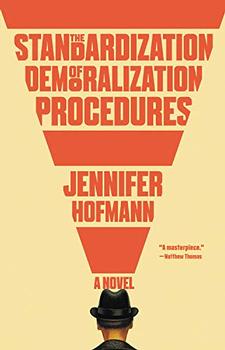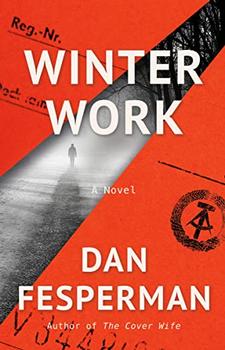Summary | Excerpt | Reviews | Beyond the book | Read-Alikes | Genres & Themes | Author Bio

 Book Reviewed by:
Book Reviewed by:
Lisa Butts
Buy This Book
The title of Jennifer Hofmann's perceptive debut novel with its bureaucratese strongly suggests a satire in the vein of Kafka or Dostoevsky, and there are certainly elements of humor and incisive critique within its pages. The protagonist is a surveillance agent for East Germany's secret police, the Stasi, and the opening scenes involve torture and references to a missing woman — lining up the tropes for a propulsive spy thriller. But The Standardization of Demoralization Procedures defies easy categorization and the reader's expectations to provide a nuanced portrayal of aging and the hollow feelings of loneliness and futility that may come along with it.
It is 1989 and Bernd Zeiger, at 60 years old, has been largely relegated to the sidelines by the Stasi's top brass. In his glory days, Zeiger wrote a handbook outlining the most effective practices for cultivating psychological distress, used by the secret police to control the population of the German Democratic Republic (GDR) and to extract information from dissidents and other suspected enemies of the state. Now, his days consist of supervising younger agents, contending with the symptoms of a mysterious illness, and eating lunch at the same cafe day in and day out. But when his favorite waitress, Lara, goes missing, Zeiger becomes determined to find out what happened to her. In the process, he recalls his brief association with Johannes Held, a physicist whose torture by the Stasi Zeiger oversaw in the 1960s.
Held's bizarre story is recounted in full in a flashback — he was sent by the GDR to take part in an experiment centered around teleportation conducted in the Arizona desert and then tortured upon his return by Stasi agents certain he knew more about this phenomenon than he was letting on. His experience in the desert is intriguing, unsettling and vividly depicted, but with the unfortunate consequence that Zeiger's story may strike readers as somewhat lackluster in comparison.
Zeiger is (for the most part) a sympathetic protagonist, as he has committed his heart, soul and life to the GDR, only to be cast aside as irrelevant. His personality (or lack thereof) and patterns of behavior seem designed to lampoon communists for their rigidity, uniformity and slavish adherence to authority; Zeiger's tie collection is a "meticulous gradation of browns and grays," except for one novelty tie featuring "a pattern of small beer mugs," given to him as a gift. Zeiger finds its whimsy grotesque: "It was a vulgar tie, hedonistic, self-righteous, Bavarian, one that created in him the same level of discomfort he experienced viewing indecent films." Yet later the government decides to ban the color gray among its ranks — it is determined to be "the sustenance of skeptics, not of socialist good cheer" — and Zeiger and his colleagues are expected to pivot on a dime to brightly colored clothing. The absurdity is funny, though this particular brand of anti-communist humor is not terribly original.
Hofmann's descriptive writing, however, is consistently unconventional and delightfully strange. One character is described as "a colossal boy with a colossal set of cheekbones and piscine eyes, features reminiscent of circus performers with pituitary problems." She also presents a realistic rendering of the malaise that accompanies feelings of redundancy. Zeiger has served for decades as a faithful instrument of the Party at the expense of any close relationships, dreams or interests of his own. With his career quickly waning, he is left only with his memories, many of which are profoundly disturbing. And if his illness is as serious as he believes it to be, he is in the midst of dying alone.
In the final pages of the novel, Hofmann offers a more nuanced critique of communism, or at least the GDR's version, that coincides with Zeiger's experience of a dramatic psychological spiraling. Zeiger questions a mental hospital doctor, hoping to learn the details of Johannes Held's whereabouts, and she asks him if he believes teleportation is real, leading to the following exchange:
'It would be a threat to national security.'
'So are cartoons, Herr Zeiger. What does it mean to you?'
'It would be a momentous contribution to science.'
'But to you. What does it stir in your soul?'
'Hope,' he admitted.
'That could be a symptom,' she said.
'Of what?'
'Psychosis. Magical thinking.'
In the GDR, hope, or any form of yearning for something other than the present state of things, is not only discouraged, it's a symptom of psychosis. Hofmann also expertly ties together the disparate threads — the missing waitress, Zeiger's illness, the teleportation experiment and the torture of Johannes Held — into a polished finished product. A genre hybrid with a mystery at its core, the novel is not perfect but it's an enigma well worth puzzling over for the quality of the writing alone.
![]() This review
first ran in the September 2, 2020
issue of BookBrowse Recommends.
This review
first ran in the September 2, 2020
issue of BookBrowse Recommends.

If you liked The Standardization of Demoralization Procedures, try these:

by Natasha Pulley
Published 2024
From the author of The Watchmaker of Filigree Street and The Kingdoms, an epic Cold War novel set in a mysterious town in Soviet Russia.

by Dan Fesperman
Published 2023
An exhilarating spy thriller inspired by a true story about the precious secrets up for grabs just after the fall of the Berlin Wall - from the acclaimed author of The Cover Wife





The House on Biscayne Bay
by Chanel Cleeton
As death stalks a gothic mansion in Miami, the lives of two women intertwine as the past and present collide.

The Flower Sisters
by Michelle Collins Anderson
From the new Fannie Flagg of the Ozarks, a richly-woven story of family, forgiveness, and reinvention.

The Funeral Cryer by Wenyan Lu
Debut novelist Wenyan Lu brings us this witty yet profound story about one woman's midlife reawakening in contemporary rural China.
Your guide toexceptional books
BookBrowse seeks out and recommends the best in contemporary fiction and nonfiction—books that not only engage and entertain but also deepen our understanding of ourselves and the world around us.